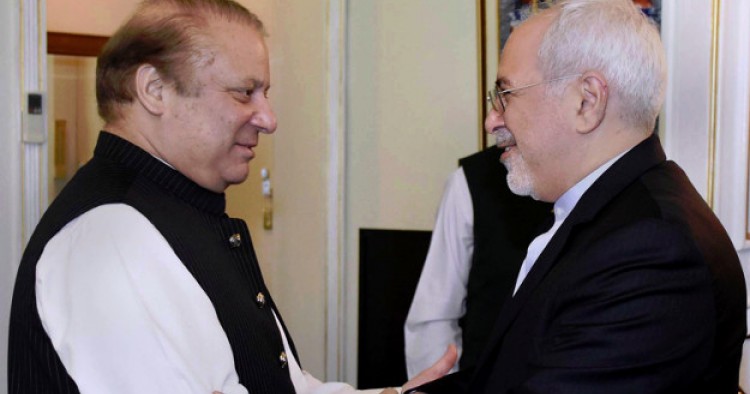Tension between Iran and Pakistan over the latest killing of 10 Iranian border guards continues to escalate despite an agreement between leaders of the two countries last week to jointly tackle cross-border issues. According to Iranian and Pakistani media, Pakistan’s Foreign Office earlier today summoned Iran’s ambassador to Islamabad, Mehdi Honardoost, after the head of the Iranian armed forces threatened to attack terrorist safe havens inside Pakistan. “We expect the Pakistani authorities to accept responsibility, control the borders, extradite the terrorists [to Iran], and shut down their bases on their soil,” Major General Mohammad Bagheri said on Monday. “If these attacks continue, we will hit terrorists’ sanctuaries and safe havens wherever they are,” he warned. Bagheri also accused Saudi Arabia and the United States of supporting terrorists along the Pakistani-Iranian borders – without providing any evidence.
Comment: On May 3, a high-ranking Iranian delegation led by Foreign Minister Javad Zarif traveled to Pakistan and held meetings with Pakistani Prime Minister Nawaz Sharif, Interior Minister Chaudry Nisar Ali Khan and Chief of Army Staff General Qamar Javed Bajwa. The two sides agreed to enhance cooperation to address cross-border terrorism and Pakistani leaders reportedly also assured the Iranian delegation that it would deploy additional troops to monitor the shared border. A statement released by Pakistan’s Interior Ministry said the two sides agreed to strengthen border security through “better coordination, greater intelligence sharing and frequent interactions” between officials of the two countries.
But Iranian leaders and media outlets express doubt about Pakistan’s resolve. “Despite this, it appears that the Pakistani government does not show a commitment to seriously monitor and increase its forces along the Iran-Pakistan border to prevent the movement of terrorists,” the Islamic Student News Agency wrote on Tuesday.
The diplomatic row between the two neighbors started two weeks ago when Pakistan-based militants crossed the border and killed 10 Iranian border guards in Iran’s restive Sistan and Baluchestan Province. Jaish ul-Adl, a Sunni militant group operating in Pakistan’s Baluchestan Province claimed responsibility for the attack.
It is not the first time that Pakistan-based militant groups carry out attacks inside Iran, but Iranian leaders have reacted more forcefully to the latest killing of the borders guards and blamed the Pakistani government’s “inaction” for it. On April 26, Iran’s President Hassan Rouhani sent a letter to Sharif, calling on Islamabad to prosecute perpetrators of an attack. The Iranian president reportedly criticized Pakistan’s “lack of necessary measures” for repeated attacks originating from Pakistan against Iranian security personnel. The Iranian foreign ministry also summoned Pakistani ambassador to protest the cross-border attack. Separately, Iran’s Foreign Ministry Spokesman Bahram Ghassemi said: “the Pakistani government should be held accountable for the presence and operation of these vicious groups on its soil.”
Iran’s Sistan and Baluchestan, one of the country’s most impoverished province, has been a hotbed for low-intensity Sunni insurgency for a long time. It shares borders with Pakistan and Afghanistan and is a key drug trafficking route in the region. The Iranian government considers the restive region a top security priority. Hundreds of Iranian security forces have been killed in the fight against insurgents and drug smugglers in the province over the past decade. And the emergence of the so-called Islamic State in neighboring Afghanistan and Pakistan and its potential spillover into Iran’s Sunni-majority southeast has forced the Iranian government to pay more attention to the once-neglected region. Both the Islamic Revolution Guards Corps (I.R.G.C.)'s ground forces and Basij units have conducted large-scale military exercises in the southeastern region in the past one year. Last month, two separate attacks killed three I.R.G.C. officers in the area.
The latest tension between Tehran and Islamabad also comes in the wake of Iran’s “reservations” about the appointment of Pakistan’s former army chief, retired Gen. Raheel Sharif, as the head of the Saudi-led coalition fighting in Yemen. Mehdi Honardost, Tehran’s ambassador to Islamabad, said last month that the Pakistani government “had contacted Iran before issuing the approval for General Raheel Sharif to join the military alliance, but this does not mean Iran is satisfied with or accept this decision by Pakistan.” Iran has opposed the Saudi-led counter-terrorism alliance of Islamic countries from the very outset. And the Iranian media has long expressed displeasure with the potential leadership role of the Pakistani general in the coalition.
The Middle East Institute (MEI) is an independent, non-partisan, non-for-profit, educational organization. It does not engage in advocacy and its scholars’ opinions are their own. MEI welcomes financial donations, but retains sole editorial control over its work and its publications reflect only the authors’ views. For a listing of MEI donors, please click here.












